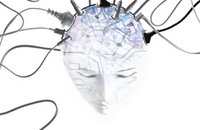Blogging on the Brain: 7/15 - 7/22
 Recent highlights from the week in brain blogging:
Recent highlights from the week in brain blogging:Videos from the 6th International Conference on Complex Systems
A Thirst for Knowledge, or Thirst for Opioids? MindHacks discusses an article by Irv Biederman (of geon fame), in which he argues that understanding is accompanied by opioid release.
Localizing Self-Consciousness: The excellent Neurocritic covers recent work on the "default network" of neural activity, which repeatedly implicates the precuneus in representing the self - or what some people might call consciousness. Could this be a neural correlate of consciousness?
Neuromarketing to Thinking Meat: TM blog mentions a recent study in which participants preferred a brand more strongly after solving an anagram - perhaps reflecting a source memory error for the feeling of recognition induced by solving the puzzle.
Paralinguistic human communication: Howard Nusbaum at the University of Chicago finds that people use a higher tone of voice to say "it's going up," relative to "it's going down," and that they speak these words at a speed related to the motion of the stimuli they're describing. In fact, unbiased observers can pick up on these paralinguistic cues - what these researchers call "spoken gestures."
Building a Better Brain: ScienceBlog found an interesting press release on the impact that positive early life experiences have on society at large.
Training Attention: MIT Tech Review has a short piece on the possibility of using real-time fMRI biofeedback to treat ADHD, in the same way this technology has previously been used to treat chronic pain.
Is Consciousness Like God?: Jaron Lanier (an early pioneer of virtual reality technology) asks whether it's possible to ever answer fundamental questions about consciousness.
And the eye-candy link of the week: visual field diffeomorphism (via Metafilter)


0 Comments:
Post a Comment
<< Home